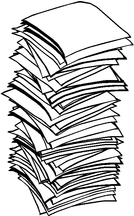Copyright © Erik Hollnagel 2022
All Rights Reserved.
Erik Hollnagel
Professor, Ph.D.
Professor Emeritus
LiU (S), ENSMP (F), SDU (DK)
The chief motive of all human actions is the desire to avoid anxiety.
Ibn Hazm (994-1064)
Writing and publishing peer-reviewed papers is a traditional way to contribute to the progress of science - although today it sometimes has degenerated into a mindless hunt for citation scores, impact factors, and various indices. The less said about that, the better. (1)
It has also become the custom to try to compile some kind of overview of one's own work. Several of my esteemed collagoues have done that, and I frequently benefit from that when I try to find an old paper or report. For people of my age, who started when writing was done on a manual typewrite and 'printing' was done using mimeographs, compiling such an overview has the advantage (at least for one self) of getting everything together in a more accessible (electronic) form.
Today, you can find many of the papers on Researchgate
Footnote
(1) I can nevertheless not refrain from noticing that the reliance on calculations to represent the quality of a journal paper, or even of a researcher's publications, is an ETTO. It is, of course, much easier to pick the scores (impact factors, etc.) and produce a single number, than actually to read papers - or even abstracts - and decide about the quality of the work oneself. The latter is definitely more thorough and in the long run more fair. But it struggles in vain against more powerful forces. (If you agree with this line of reasoning, you might enjoy the following paper: Ioannidis, J. P. A. (2005). Why Most Published Research Findings Are False. PLoS Medicine, 2(9), 696-700. DOI: 10.1371/journal.pmed.0020124)

